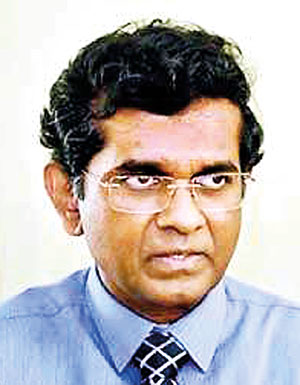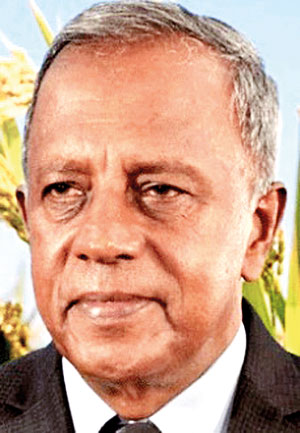Sunday Punch
Spate of resignations in September plagues Govt
 The resignation of a Consumer Affairs Authority’s Executive Director on Tuesday marks another addition to the growing list of top officials who have handed in letters citing ‘personal reasons’ and left their vital post while the nation battled a war of survival on many fronts.
The resignation of a Consumer Affairs Authority’s Executive Director on Tuesday marks another addition to the growing list of top officials who have handed in letters citing ‘personal reasons’ and left their vital post while the nation battled a war of survival on many fronts.
The September spate of resignations was triggered off by the sudden departure of Dr. Ananda Wijeywickrama, the eminent senior consultant physician of the National Institute of Infectious Diseases. A frontline medical expert in the battle against the COVID pandemic, he was a leading figure in the Health Ministry’s Intercollegiate Technical Committee, tending scientific advice on many aspects on the COVID war, including the vaccine rollout.

RESIGNS: Dr. Asoka Gunaratne
On September 7, he resigned from this Technical Committee of the Director-General of Health Services but gave no reason for quitting, except, of course, to say it was personal. He made it clear to the media that since he was a government servant, he was barred from speaking to the media and revealing the reasons that had bade him resign.
The same evening, after having lost one of its eminent committee members, the Deputy General of Health Services, Dr. Hemantha Herath, made a public appeal to Dr. Wijeywickrama to please reconsider his decision. He said: “Dr. Wijeywickrama has been one of the key medical professionals who immensely rendered his support and advice in the battle against COVID-19 pandemic in the country. His decision to step down would badly affect the way forward in terms of eliminating COVID-19.”
But to no avail. The good doctor, after having come to the end of his tether and broken free, had no intention to return to the fold. He did not even condescend to respond to Dr. Herath’s belated plea but spurned it in studied silence.
Following on the heels of Dr. Wijeywickrama, Consultant Anesthetist Dr. Asoka Gunaratne also stepped down on September 8 from the same Technical Committee, citing ‘personal reasons’ as the cause but he has made it known he quit the committee since he felt he was of no use to it.

RESIGNS: Dr. Ananda Wijeywickrama
It even affected the zoo. The Director-General of the National Zoological Gardens, Ishini Wickremesinghe, resigned from her post on September 9. A niece of former UNP Prime Minister Ranil Wickremesinghe, animal rights activist, Ishini, had directed a pro-Rajapaksa campaign in the 2019 presidential elections at her father Shan Wickremesinghe’s television channel, TNL, and had been appointed zoo director upon the party coming to power.
Even though she had given ‘personal reasons’ as the cause of leaving the zoo, the State Minister of Wildlife Protection, Wimalaweera Dissanayake, however, took pains to rule out any connection between her resignation and the release of 14 elephants back to its owners’ captivity the day before on September 8, and maintained her resignation on September 9 was purely personal.
The scourge of resignations was to strike again. This time it struck in the nation’s rice bowl: the Paddy Marketing Board. Its Chairman Dr. Jatal Mannapperuma, who holds a doctorate from an American University, tendered his resignation on September 15 to the Agriculture Minister Mahindananda Aluthgamage citing ‘personal reasons’.
He told reporters he resigned as he felt implementing decisions taken by those above him was ‘unwise’ and that he could not, with a clear conscience, be happy with backing such imprudent decisions. He said: “No one would resign without a reason. There were several reasons for my resignation. I don’t like to talk about them to the media though.”
Next it was the turn of the Government’s Banker: The Governor of the Central Bank, W. D. Lakshman. Of course, in his case, he was resigning simply to make way for the State Minister of Finance Nivard Cabraal who was resigning from both his seat and position but not from his SLPP membership to be installed as the new guv at the nation’s premier financial institution. It was, perhaps, given the nation’s impecunious state, a last resort appointment to the bank of last resort. But for it to materialize, the incumbent official had to be given the elbow.

RESIGNS: Dr. Jatal Mannapperuma
An economics professor with an Oxford doctorate, and a former Vice Chancellor of the Colombo University, Prof. Lakshman had been teaching for 40 years when, at the age of 78 he was appointed by Gotabaya Rajapaksa as Governor for a legally fixed term of six years on Christmas Eve in 2019. But after just one year in office, he had not planned on seeing another Christmas in the Governor’s chair to merely receive the season’s hampers but had planned on retiring on his 80th birthday next month.
“I had intended to retire on my 80th birthday next month,” he told a virtual media briefing on September 10, “but there were some unpleasant incidents these last two weeks, so I decided to resign in advance on September 15. There had been so many reports without asking me. But I go with a clear conscience.”
Thushan Gunawardena, one of the three executive directors of the Consumer Affairs Authority, was also one of the men who rode the resignation wave that swelled early this month. He handed his letter of resignation this Tuesday but, unlike the others who had cited ‘personal reasons’ as the cause, he did not give any reason. He says he felt he had no need to explain.
True. Why explain to the State Minister of Consumer Protection, Lasantha Alagiyawanna, the reason he was quitting, when he had revealed the dirt to a TV journalist a few days before the date of formal departure. In a televised interview, he described his disillusion with the way the promised vistas of prosperity and splendour, which had so inspired him to apply for a government post, were fast dissipating before his eyes and claimed: “Things are done the way the racketeers want it done.”
Making many allegations, he referred to the recent garlic racket where garlic had been imported by a private trader. The trader was making arrangements to get the stocks cleared when some officials of Sathosa, using a recent Cabinet decision which empowered Sathosa to acquire essential goods not cleared within a certain period, had acquisitioned the garlic consignment. It had then been sold to a private vendor for Rs. 135 a kilo. The vendor in turn had resold the consignment to Sathosa for Rs. 450 a kilo. He said this has also happened with flour, sugar and urad dhal in the past. “I have been under pressure from various quarters to resign since they feel I am hampering these activities,” he said, “and I have received serious death threats that it is no longer safe for me to continue in this post.”
But before ill winds had swept it into a wave, the ripples of resignation had started early in the year. In February, Major General Sumedha Perera resigned from his post as Secretary to the Ministry of Agriculture. In March, the National Medicines Regulatory Authority (NMRA) Chairman, Professor Asitha de Silva, resigned. In April, the Chairman of the National Housing Development Authority, Renuka Perera resigned with Duminda Silva, newly released from prison following a presidential pardon for murder, appointed the new chairman.
In June, after a lull in May, the winds blew with fury and a flood of resignations ensued. Project Director Dr. Jayasundara Bandara of the COVID-19 Emergency Response resigned; Professor Pathmeswaran and Professor Neelika Malavige both on the independent vaccine advisory committee resigned; the Secretary to the Ministry of Agriculture Rohana Pushpakumara resigned, becoming the second secretary of the Agriculture Ministry to have resigned in the year, after having been appointed on March 1; the Chairman of the Tea Small Holdings Development Authority Mahinda Vidanapathirana, too, resigned.
These resignations are but a few of the tombstones erected to mark the premature demise from public office in this year alone, and this month in particular. Though many feigned the silence of the dead and stayed tight lipped on why they had hung up their hats, their unsaid words convey a clear and unequivocal damning message that prevent the rest from resting in peace.
This flurry of resignations from government service, this exodus of men, still extant in Lanka, who can take a principled stand and place honour before lucre, will lift the last remaining checks on corruptive political power and allow it to run amok without restraint; and will leave vacant chairs to be filled by political cronies to further entrench and perpetuate institutionalised corruption.
“The strength and power of a country,” said 19th century political economist and philosopher John Ruskin, “depends absolutely on the quality of good men and women in it.” How true. If the few left remaining also give up the ghost, then this nation will be truly done for.


Leave a Reply
Post Comment